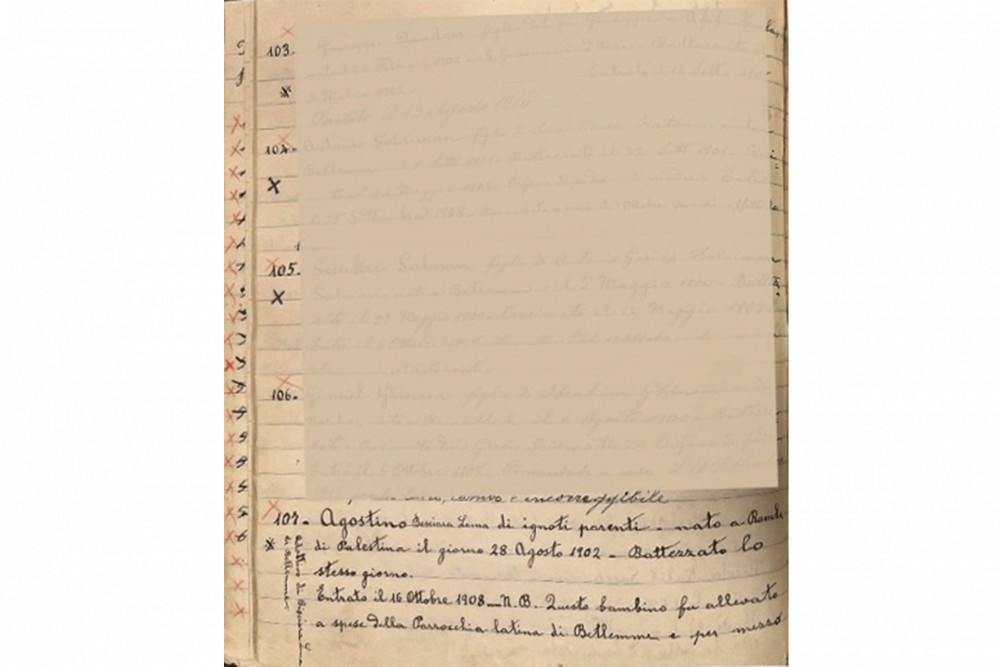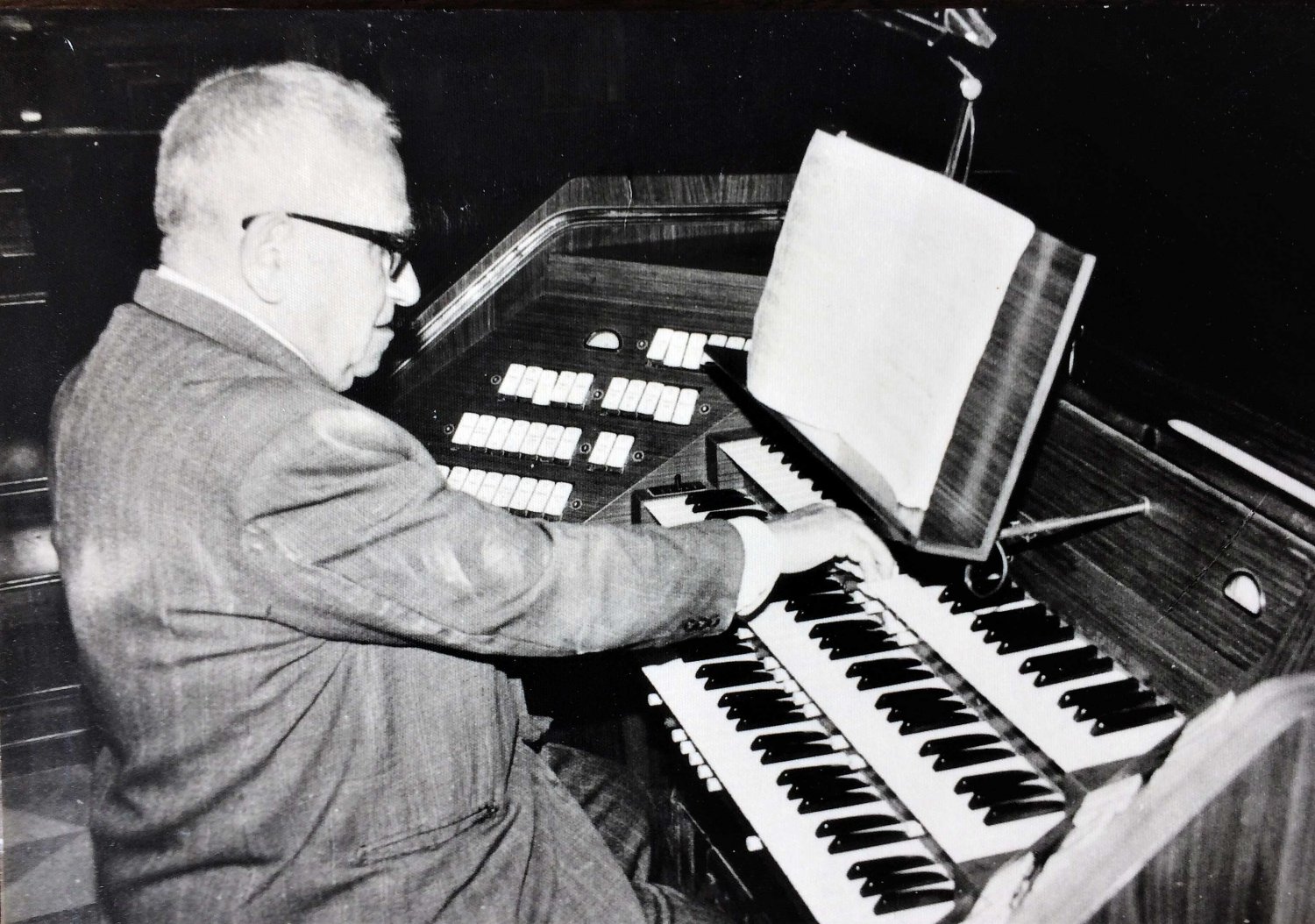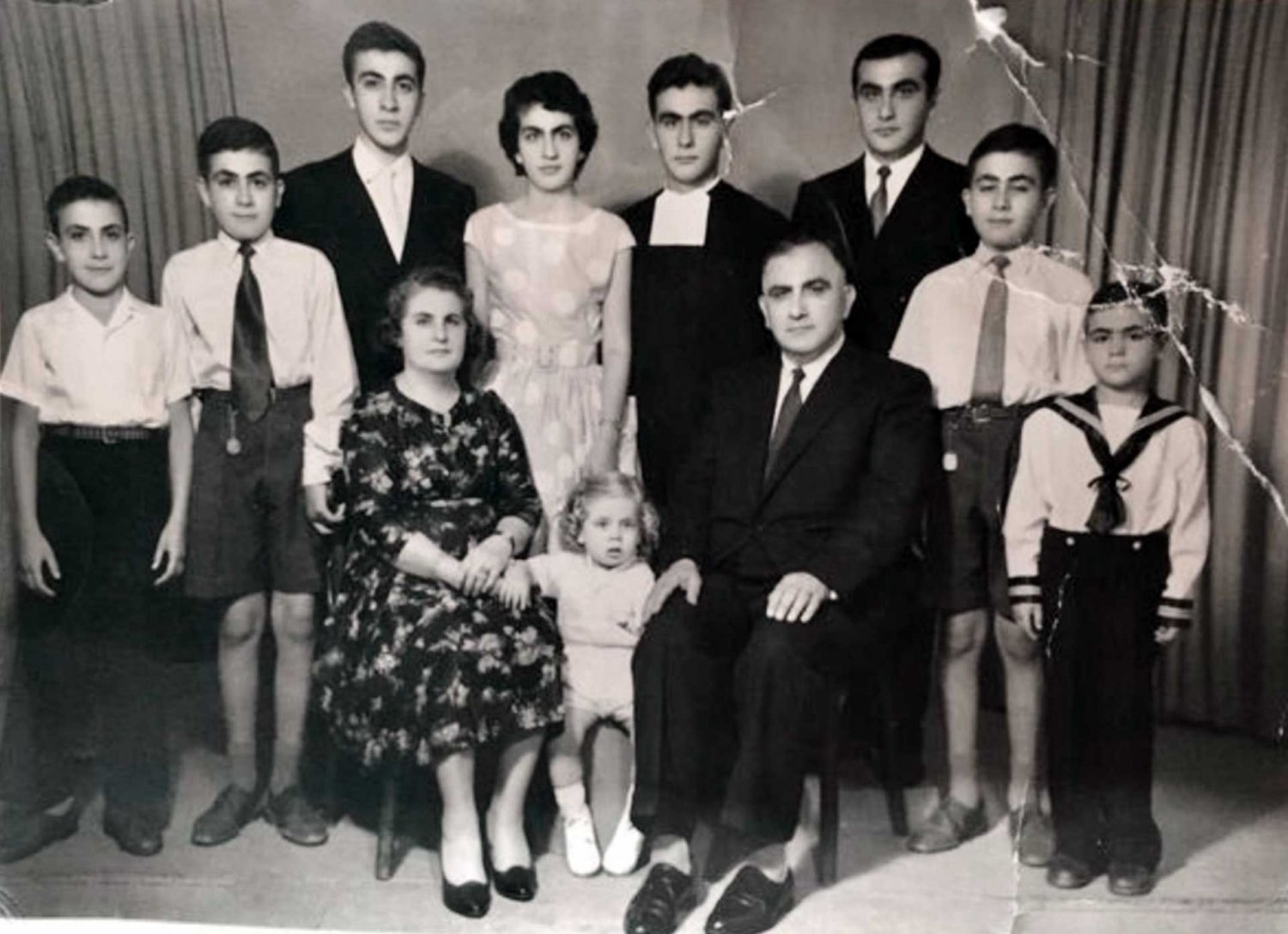Augustine Lama was a world-class Palestinian composer and organist. Lama spent most of his life producing musical compositions, teaching Palestinian youth musical skills, and holding performances of Arab music in Jerusalem.
Early Life and Education
On August 28, 1902, Augustine Lama was born Agostino Bisciara al-‘Ama in the Palestinian city of Ramla. His mother, Maria Girgis, was originally from Bethlehem, as was his father, Bishara Yusuf al-‘Ama, who was a merchant. His parents were devout Catholics, and their family name al-‘Ama changed to Lama when the couple immigrated to Latin America, sometime around the 1840s.1
Maria and Bishara also had two older daughters, Wadi’a and Katrina, both of whom were already married by the time Lama was born. At the age of six, Lama was placed in an orphanage in Ramallah, even though both his parents were alive. It seems that his father fell chronically ill around that time and eventually passed away in 1912 in Bethlehem.2 In his will, he requested that the Franciscan priests of St. Catherine’s church in Bethlehem, with whom he had a close relationship, send his son to a school in Jerusalem.
In accordance with his father’s wishes, Lama attended Jerusalem’s Terra Sancta Franciscan School, which was one of the first institutions to introduce music as a teaching discipline.3 There, Lama studied classical Western music under the Franciscan monks and quickly developed a love and talent for it. He would find any excuse to make his way to the school’s music room and play the piano. Already at age 12, he performed as a church organist.4 In addition to his native Arabic language, Lama learned English, French, Spanish, and Italian.
One of his teachers, an Italian Franciscan priest, returned to Italy at the beginning of World War I and left the position of church organist empty. On January 1, 1920, the Custos, Ferdinando Diotallevi, appointed Lama, then just 18, as organist of the Basilica of the Holy Sepulchre, a position he held until his death in 1988.5 By the time he turned 20, Lama was the chief organist for the Catholic Church of Palestine, a position he held until he retired.6
Music
Lama spent the rest of his life serving Jerusalem’s holy sites through his music and in the service of the Franciscan Custody. He conducted choirs, played organs, and held performances of Arab music. He started the first boys’ choir in the Middle East. His own musical compositions leaned toward classical musicals, specifically 18th-century and late romantic styles. In these genres, he composed many chorales and pieces for the organ. He also composed hymns, choir chants, two masses, and other works. While his compositions were all similar in structure, they displayed versatility in melody.
One of his famous organ pieces, titled Postlaudio, was written in November 1948 for Jerusalem, after the city had suffered the extensive effects of war. The piece expressed sadness and despair about the state of the country.
Indeed, after the 1948 War erupted, according to Maria Chiara Rioli and Ricardo Castagnetti, “the family took refuge in St Louis’ Hospital, near the New Gate. After the assault by the Haganah, the family was split and Augustine was transferred to a camp. After he was released through the efforts of the French Consulate a few months later, he took refuge in St. Saviour’s.”7
Some of Lama’s other famous chorales are Cognoverunt Discipuli and Velum Templi.8
In an interview held in 1946, Lama was asked about how he composed his music and he responded with the following description:
Many believe that setting the right mood is necessary for composing music, and indeed this may play a part to release the mind from material thoughts—that release that takes the artist away from many of the things that occupy his thoughts and subconscious. However, for me, I don’t believe in setting the mood, or even smoking. When I want to compose, I retreat within myself in the quiet of the night, hanging in the world of imagination until I feel the melodies come to me and begin to take form. I repeat them with my voice and whistle them out, and once they settle clearly in my mind, I hurry to the piano and play them, then note them down.9
Life and Legacy
Lama dedicated his life to God, family, and society. The Vatican ordained him an honorary member of the Roman Catholic Franciscan order, and Jordan’s King Abdullah I awarded him with the Independence medal in 1934 following his visit to Terra Sancta College in Jerusalem.
Throughout his musical career, Lama helped the youth of his community discover and develop their musical skills and encouraged them to compose orchestral pieces. Two of his students, Salvador ‘Arnita and Yousef Kasha, flourished under his mentorship and became celebrated Palestinian composers. His own son, Patrick, also studied with his father and went on to become a renowned composer and pianist himself.
Lama is generally considered to be the “Father of contemporary Palestinian music.”
Some comments made on Facebook about his impact on his students include the following:
Monsieur Lama—May his beautiful soul Rest In Peace—was my first piano teacher!!! A refined musician, a walking encyclopedia and a true gentleman with a heart of gold! He utterly has instilled the love for music, within me as well as within many others, too. Furthermore, he has encouraged me to constantly listen through my heart!!! With my hand on my heart, I declare that I am forever in awe to Monsieur Lama. His magical talent granted whoever heard him playing, own time and place and dwell in the MAGNIFICENT!!!10
Marcelle B. Khoury
The father of Palestinian music! A great man, a great musician, organist and composer. My father Salvador Arnita was always proud to have been his student. May their souls Rest In Peace.11
Shadia Arnita Jacir
Today his scores are kept mainly in the Franciscan Custody archive and in the Lama family private collection.
Lama married Virginie Avakian, an Armenian, and the couple had nine children: Tony, Armand, Patrick, Josephine, identical twins Freddy and Francois, and Johnny, Angelo, and Joseph.
By the age of 80, Lama was growing frail and finding it increasingly difficult to walk; however, despite his deteriorating health conditions, he continued to play his organ: “If I could only get another leg, I would play the organ for many years to come,” he said.12
Lama retired at the age of 83 and passed away three years later, on July 19, 1988, in Jerusalem.
Sources
“A Cup of Coffee with Musician Augustine Lama.” [In Arabic.] Arab48. Last modified December 12, 2018.
“A Journey to Discover the Roots of Augustine Lama.” [In Arabic.] Terra Sancta Museum. Last modified November 8, 2023.
“Augustine Lama.” All 4 Palestine. Accessed June 10, 2024.
Jacir, Shadia Arnita, “The father of Palestinian music!” Comment posted on the British Mandate Jerusalemites Photo Library Facebook page, 2021.
Jayyusi, Lena, ed. Jerusalem Interrupted: Modernity and Colonial Transformation 1917—Present. Northampton, MA: Olive Branch Press, 2015.
Khoury, Marcel B. “Monsieur Lama—May his beautiful soul Rest In Peace . . .” Comment posted on the British Mandate Jerusalemites Photo Library Facebook page, 2023.
Rioli, Maria Chiara, and Riccardo Castagnetti. “Sound Power: Musical Diplomacy within the Franciscan Custody in Mandate Jerusalem.” In European Cultural Diplomacy and Arab Christians in Palestine, 1918–1948, edited by Karène Sanchez Summerer and Sary Zananiri, 79–104. Cham: Palgrave Macmillan, 2021.
Shaked, Yuval. “On Contemporary Palestinian Music.” Search Journal for New Music and Culture 8 (2011): 1–11.
[Profile photo: This Week in Palestine]
Notes
“Augustine Lama,” All 4 Palestine, accessed June 10, 2024.
“A Journey to Discover the Roots of Augustine Lama” [in Arabic], Terra Sancta Museum, last modified November 8, 2023.
Lena Jayyusi, ed., Jerusalem Interrupted: Modernity and Colonial Transformation 1917—Present (Northampton, MA: Olive Branch Press, 2015), 63–64.
Yuval Shaked, “On Contemporary Palestinian Music,” Search Journal for New Music and Culture 8 (2011): 1–11.
Maria Chiara Rioli and Riccardo Castagnetti, “Sound Power: Musical Diplomacy within the Franciscan Custody in Mandate Jerusalem,” in European Cultural Diplomacy and Arab Christians in Palestine, 1918–1948, ed. Karène Sanchez Summerer and Sary Zananiri (Cham: Palgrave Macmillan, 2021), 79–104.
“Augustine Lama.”
Rioli and Castagnetti, “Sound Power.”
Shaked, “On Contemporary Palestinian Music.”
“A Cup of Coffee with Musician Augustine Lama” [in Arabic], Arab48, last modified December 12, 2018.
Marcel B. Khoury, “Monsieur Lama—May his beautiful soul Rest In Peace . . .” Comment posted on the British Mandate Jerusalemites Photo Library Facebook page, 2023.
Shadia Arnita Jacir, “The father of Palestinian music!” Comment posted on the British Mandate Jerusalemites Photo Library Facebook page, 2021.
“Augustine Lama.”



